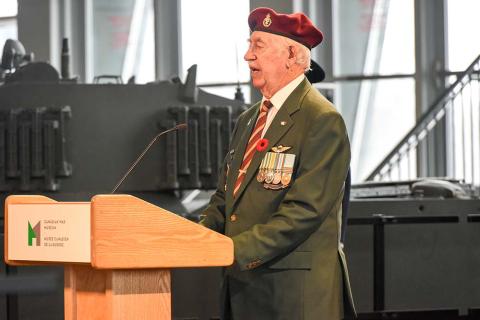
Ron Bourgon was born in Ottawa in 1931. After graduating high school, he went on to the University of Ottawa, but left his undergrad after two years, when the Korean War broke out in 1950. That summer, a recruitment advertisement in a local newspaper caught his eye, and, despite being anxious, he and his friends saw an opportunity to serve their country. That was all it took for him to enlist in the Canadian Army, despite his mother’s dissenting words.
After enlisting, Bourgon was assigned to the Princess Patricia’s Canadian Light Infantry (PPCLI), the Canadian battalion that fought in the Battle of Kapyong. He headed west to receive his basic training in Alberta.
Before setting sail for Korea, Bourgon knew very little about the country. Truth be told, he actually believed it was part of Japan. He remembers being shocked at the differences between Korea and North America when they first landed in December 1950.
“We arrived in Busan, and we were billeted in a school,” says Bourgon. “There were a lot of refugees at the time – there were so many of them throughout the city.”
Shortly after , he found himself on his way to the frontlines. There, he and his fellow soldiers lived in tents and constantly patrolled the area. They trekked up and down mountains, searching for enemy defensive positions and patrols.
“We never really had a chance to do anything because we were always on guard duty,” says Bourgon.
In April 1951, Chinese and North Korean forces overran South Korean positions near the 38th parallel, forcing them to retreat. That’s when the 27th Commonwealth Brigade, which included Canadian, British, Australian and New Zealander Regiments, was called up to cover the South Korean advance.
In the hills above the Kapyong Valley, the 27th Brigade hunkered down into defensive positions. The Canadian Regiment, the 2nd Battalion of PPCLI, chose what was known as Hill 677.
During the night of April 23, the Australian regiment came under attack, and the Australians were soon forced to retreat. The next night, Communist forces attacked the Canadians.
“The Australians couldn’t hold that position,” says Bourgon. “They had go to back about four miles then regroup on another hill. And then, they hit PPCLI.”
“There was very little ammunition left. There was hand-to-hand combat with bayonets.”
The Canadians were heavily outnumbered, and the battle was intense. He remembers how they called an artillery strike on their own position, taking cover in deep foxholes.
“There was very little ammunition left. There was hand-to-hand combat with bayonets,” says Bourgon. “We called in artillery and for more than half an hour, artillery fell around us.”
While it was a risky strategy, they succeeded in driving off the enemy forces among them, and the Battle of Kapyong ended the next day. Ten Canadians died and 23 were wounded during the battle, and their courageous efforts helped prevent a potential attack on Seoul.
While Bourgon survived, he returned from the Korean War wounded after being struck in the back by shrapnel. He left the Army in 1953, and went on to work with a law firm in Montreal, before returning to Ottawa and becoming a farmer in the late 1960s.
“The change in the country – it’s unbelievable when you get off the plane.”
At age 89, Bourgon still participates in commemorative events for the Battle of Kapyong and the Korean War. He is proud of the role he played in helping South Korea become what it is today. Having returned to visit, he is awed by the stark contrast from what he remembers.
“The change in the country – it’s unbelievable when you get off the plane, the streets are clean and every place you go is nice.”
With courage, integrity and loyalty, Ron Bourgon has left his mark. He is one of our Canadian Veterans. Discover more stories.